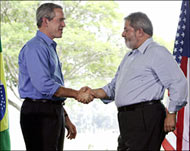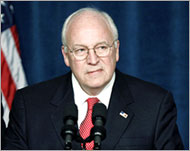Bush: Terror suspects not tortured
US President George Bush has vigorously defended attempts to interrogate suspected terrorists after the public disclosure of secret CIA prisoner camps in Eastern European countries.

“We do not torture,” he declared on Monday. “There’s an enemy that lurks and plots and plans and wants to hurt America again,” Bush said in Panama, on the last leg of a Latin America tour.
“So you bet we will aggressively pursue them, but we will do so under the law.”
Over White House opposition, the Senate has passed legislation banning torture. With Vice-President Dick Cheney as the point man, the administration is seeking an exemption for the CIA.
It recently was disclosed that the agency maintains a network of prisons in Eastern Europe and Asia, where it holds terrorist suspects.
The European Union is investigating the reports, which have not been confirmed by the White House.
Country at war
“Our country is at war, and our government has the obligation to protect the American people,” Bush said.
“Any activity we conduct is within the law. We do not torture.”
 |
|
Bush (L) greeting Luiz Inacio Lula |
Bush spoke at a news conference with Panamanian President Martin Torrijos on the last day of five-day Latin America trip that also took him to Argentina and Brazil.
Bush glossed over an ongoing dispute about having a free-trade zone spanning the Western hemisphere.
At a summit in Argentina over the weekend, 34 nations failed to agree to restart talks on the US-backed Free Trade Area of the Americas. Bush said that 29 nations said “loud and clear” that it is important to advance a trade agenda.
Michael Shifter, a Latin American expert at the Inter-American Dialogue research group in Washington, said Bush’s stop in Panama was in part an attempt to show America’s willingness to erase its image as a heavy-handed neighbour in the hemisphere.
“I think he’s saying that the US doesn’t have to control everything – that the US is able to sort of yield, and when it does, things can go well,” Shifter said.
Troubled landscape
Bush returns to Washington to a troubled political landscape. White House aide Karl Rove is under a legal cloud in the CIA leak case and the president is at a low point in approval polls.
The Pentagon has approved a new directive to tighten control over the interrogation of terror suspects and other prisoners by US soldiers, The New York Times said on Tuesday.
 |
|
Cheney says the new anti-torture |
The directive ensures that interrogation techniques are approved at the highest levels in the Pentagon, that interrogators are properly trained and that personnel are required to report abuses, army officials told the daily.
It reaffirms that military dogs may not be used in interrogations and that military police may provide interrogators information about detainees’ behaviour but may not take part in the interrogations.
“Acts of physical or mental torture are prohibited,” said a copy of the directive obtained by the daily.
Signed on Thursday without any public announcement by Acting Deputy Defence Secretary Gordon England, the directive comes at a time when US government interrogation techniques have come under fire in Congress.